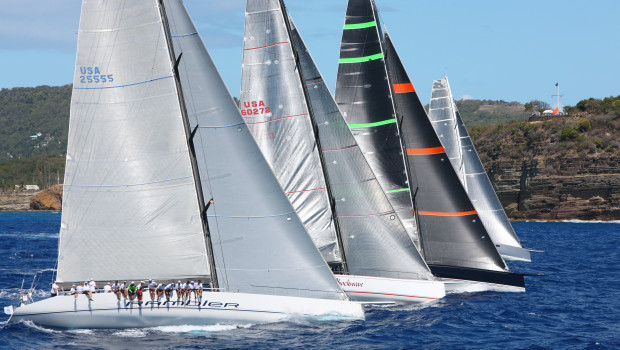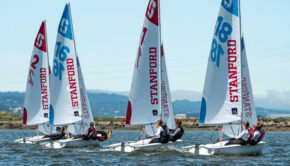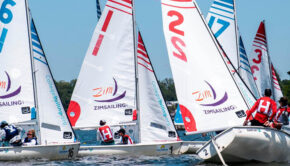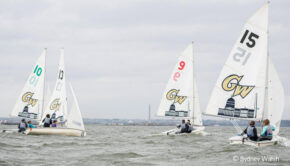When playing hooky from school proves to be the best education
Published on March 3rd, 2014
When George David’s Reichel Pugh 90 Rambler took part last week in the 6th edition of the RORC Caribbean 600 last week, tactician/navigator Peter Isler enlisted his daughter Marly Isler to join the crew. As a college sophomore at Yale who has sailed dinghy regattas her whole life, Marly shares her notes on the experience…
 Going into the race, this was clearly going to be huge change and an incredible opportunity. How could it not be? But after the race, when I started writing down a few takeaways, I realized the experiences along this 600 mile race were pretty applicable to the college racing I do now, and really all sailing in general.
Going into the race, this was clearly going to be huge change and an incredible opportunity. How could it not be? But after the race, when I started writing down a few takeaways, I realized the experiences along this 600 mile race were pretty applicable to the college racing I do now, and really all sailing in general.
My first surprising observation was offshore and college racing aren’t that different. You get about the same amount of sleep doing both, a Nature Valley bar constitutes a meal, and passing out with your shoes happens quite a bit. But that’s only just the beginning:
1. Any sailing you do makes you better.
I came into this regatta thinking I would get a nice tan after a cold New England winter, spend some time with my dad, and have a great story. But it was so much more than that. Although Rambler was a lot bigger than my typical Flying Junior or 420, a boat is a boat.
Listening to the crew communicate before the start, hearing their decision-making on where to go for pressure or current, and their tactics for boat on boat maneuvers was all about the same stuff that happens in a dinghy race. No matter what type of sailing you do – trying out a new boat, sailing with someone new, or just doing something outside of your comfort zone in the sport will always be beneficial to your sailing in the long term.
2. Do your homework.
And I don’t mean for your classes (but I did miss a week of school for this race). A huge part of offshore sailing is the planning. For the few days before the event, the crew was all sent emails with forecasts for the race. Not knowing the forecast or current habits would put you behind even before the race starts. Any shift or lull is just as important in a 600 mile race as it is in a short-course dinghy regatta. After sailing on Rambler and seeing the amount of work that goes in to checking these forecasts, and how hugely they affect the game-plan, I’m definitely going to be more diligent in doing my pre-race homework before the next regatta.
3. Teamwork and communication are key.
One of my favorite parts of college sailing is the team aspect, and it was really cool to see that was also the case for offshore sailing. All the crew are so close, and that community feel not only adds to the fun, but also makes everyone work better. It’s really easy in college sailing to get stuck in your own issues, or have a bad set of races, but it’s so important to work as a team and always try to be a positive member. The crew this past week was always stepping up to help each other grind or haul a sail on deck, and I think that teamwork goes a long way in all parts of sailing.
4. We all do this for fun.
This might seem like an obvious and unnecessary point, but I left it in because I sometimes forget it. Being from California, I’ve had a hard time with the cold involved with college sailing in New England, and I am the first to complain about having to wear a drysuit. So maybe it was just the incredible weather we had on the race, but all the crew was consistently so happy.
Sailing is fun, and if it wasn’t we wouldn’t be out on the water in the first place. I’ve learned that it’s very important to take a step back for a moment when you’re out on the water and realize that even if you have are DFL, or your hands are freezing on the Charles River, it could be a lot worse. Just as the crew on Rambler was having way more fun than if they were in an office, even on my worst days of college sailing, I’m definitely having more fun than the other kids in my class sitting in the library at that time.
5. And finally, ask the right questions.
It was cool to be able to see how my dad works onboard Rambler. One of the biggest things I learned from him this weekend was in his style of communication. He consistently would ask the guy driving or doing main, “Are you happy?” At first, I found this question to be a little strange, but I later realized how valuable the answer to that question can be. It’s not only checking in to see if the sailor likes the trim, the angle they are heading, or whatever, but also their experience as a whole.
It’s easy to look back at the race and replay that missed pressure on the shore of Guadeloupe Island that Bella Mente got, and have that be the deciding factor on how the race went. But really, what matters more in our sport is just being able to look back on a time you went sailing and recognize that your answer to my dad’s question is a yes.
I hope my random assortment of things I learned can be of use for anyone with a desire to do some offshore sailing. My background was complete removed from offshore sailing, yet in retrospect I found a lot of common ground. Now, if I could just get the Yale campus to move to the Caribbean…









 We’ll keep your information safe.
We’ll keep your information safe.